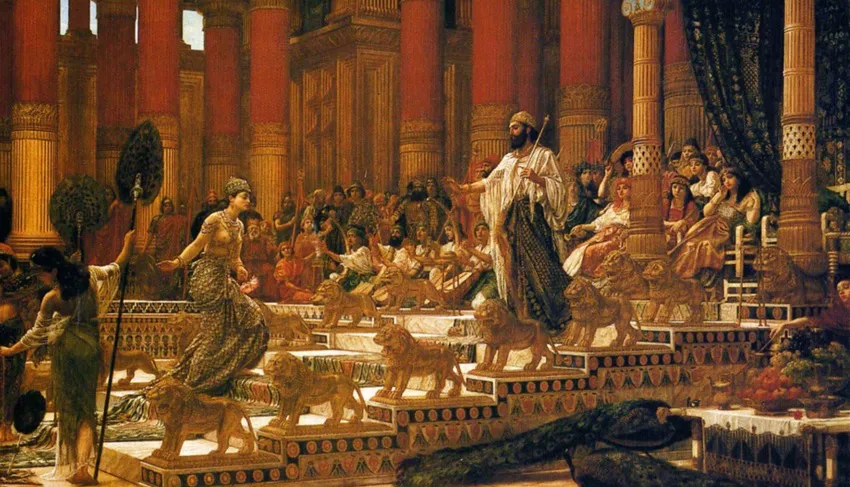King Solomon, renowned for his unparalleled wisdom and immense wealth, remains a figure of fascination and intrigue. As the third king of Israel, Solomon’s reign is celebrated for its prosperity, architectural achievements, and legendary riches. But what if we were to translate his wealth into modern terms? This article explores the estimated value of King Solomon’s wealth in today’s context, considering historical accounts, inflation, and modern financial equivalents.
Historical Context of King Solomon’s Wealth
King Solomon’s wealth is well-documented in the Bible, particularly in the Old Testament. His riches were often described as unmatched in his era, contributing to a reign marked by peace and prosperity. Solomon’s wealth was not just in gold and silver but also in luxury goods, trade alliances, and a vast empire.
The Biblical Account
According to biblical accounts, Solomon received enormous quantities of gold annually. For instance, 1 Kings 10:14 states, “The weight of the gold that came to Solomon in one year was six hundred threescore and six talents of gold.” This translates to roughly 25 tons (or 22.7 metric tonnes) of gold each year. Additionally, Solomon’s wealth included precious stones, fine materials, and large-scale construction projects like the Temple of Solomon.
Solomon’s Economic and Political Influence
Solomon’s wealth wasn’t just a result of his personal assets but also his political acumen. He established trade agreements and alliances, such as those with Hiram of Tyre, which enriched his kingdom. His reign saw a flourishing economy, with extensive trade networks bringing in valuable goods from across the ancient world.
See Also: How Was Mary Chosen to Carry Jesus?
Translating Ancient Wealth to Modern Terms
To estimate King Solomon’s wealth in today’s terms, we need to consider several factors: the value of gold, inflation, and the economic context of his reign.
The Value of Gold
Gold is a critical component in estimating Solomon’s wealth. As of today, gold prices fluctuate around $1,900 to $2,000 per ounce. There are 32,150.7 ounces in a metric tonne, so with Solomon’s reported 22.7 tonnes of gold, we can calculate:
- 22.7 tonnes x 32,150.7 ounces/tonne = 729,596.9 ounces
- 729,596.9 ounces x $1,950 (average gold price) = $1,424,740,205.00
Thus, Solomon’s annual gold alone would be worth approximately $1.42 billion today.
Inflation and Purchasing Power
Inflation is another crucial factor. Over thousands of years, the purchasing power of money changes drastically. To convert ancient wealth into current values, experts often use the concept of purchasing power parity or historical inflation rates. However, exact figures are challenging to determine.
Some historical economists estimate that a talent of gold in Solomon’s time could be worth between $1 million to $2 million in today’s dollars. Given Solomon’s wealth of 666 talents annually, this would translate to:
- 666 talents x $1,000,000 (low estimate) = $666,000,000
- 666 talents x $2,000,000 (high estimate) = $1,332,000,000
Thus, Solomon’s annual wealth could be valued between $666 million and $1.33 billion in today’s money, not accounting for other assets.
Additional Assets
Solomon’s wealth was not limited to gold. He owned vast quantities of silver, precious stones, and luxury goods. 1 Kings 10:21 notes, “All King Solomon’s goblets were gold, and all the household articles in the Palace of the Forest of Lebanon were pure gold.” The Bible also mentions his considerable fleet of ships and trade resources, further adding to his wealth.
In modern terms, the value of silver and other assets would further increase Solomon’s net worth. Given the extensive nature of his assets, a comprehensive estimate of Solomon’s total wealth could reasonably exceed $2 billion today.
Comparisons with Modern Wealth
To contextualize King Solomon’s wealth, we can compare it to modern billionaires and their fortunes. For instance, as of recent reports, billionaires like Elon Musk and Jeff Bezos have net worths exceeding $200 billion. Although Solomon’s wealth might not match the absolute highest contemporary fortunes, it would still place him among the richest individuals of his time.
Comparison with Historical Figures
Solomon’s wealth can also be compared with other historical figures known for their riches. For example, Mansa Musa, the 14th-century emperor of Mali, is famous for his immense wealth and extravagant pilgrimage to Mecca. Solomon’s wealth, when adjusted for inflation and purchasing power, would rival or exceed such historical figures.
Economic Impact of Solomon’s Wealth
King Solomon’s wealth had a significant impact on his kingdom and the ancient world. His reign was marked by stability, architectural achievements, and international trade. The Temple of Solomon, a grand project funded by his wealth, became a central place of worship for the Israelites and a symbol of his opulence.
Influence on Trade and Diplomacy
Solomon’s wealth facilitated extensive trade and diplomatic relationships. His dealings with other nations, such as the Queen of Sheba’s visit, showcased his kingdom’s economic prowess and strategic alliances. These relationships likely boosted both his wealth and influence on a global scale.
Cultural and Religious Legacy
The cultural and religious impact of Solomon’s wealth is also notable. His reign is often viewed as a golden age for Israel, with his wisdom and prosperity serving as a model of divine favor. The stories of his riches have become legendary, reinforcing the perception of his unmatched wealth.
Conclusion
Estimating King Solomon’s wealth in today’s terms is a complex task involving historical data, inflation adjustments, and comparisons with modern economics. His annual wealth in gold alone could be valued at over $1 billion today, while additional assets and influence would likely increase this figure significantly.
Solomon’s riches, combined with his wisdom and governance, created a legacy of prosperity and stability that continues to captivate historians and theologians alike. While his wealth might not directly compete with the highest modern fortunes, it undoubtedly established him as one of history’s most prosperous figures. The grandeur of his reign serves as a testament to the impact of wealth and wisdom in shaping the course of history.

